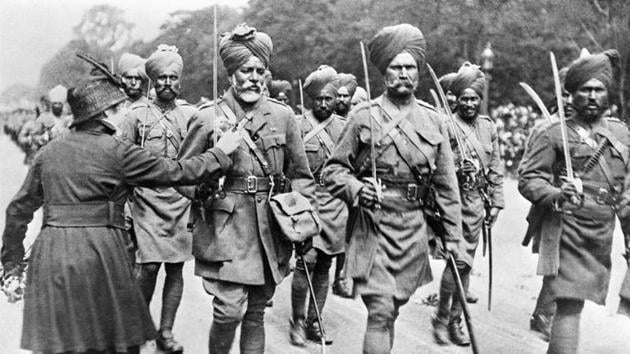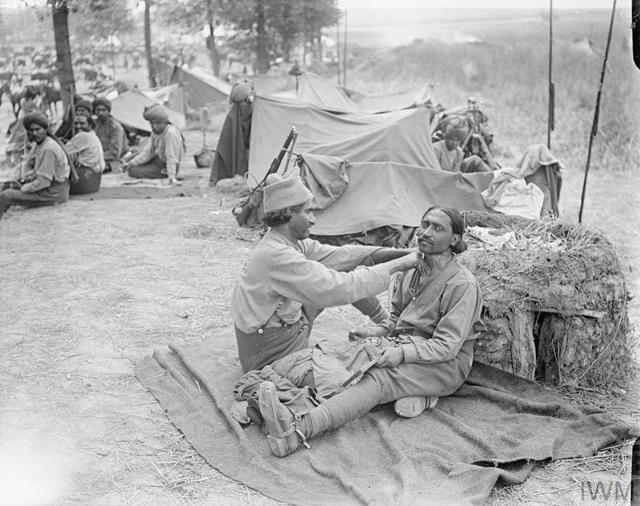Indian response to World War 1 variegated, literature reflects that
A 100 years after the end of the Great War, it is useful to see how Indians themselves responded to the events surrounding a war to which they contributed immensely without fully comprehending its reasons and implications; even though their response is not uniform and un-variegated.
Literature, they say, holds up a mirror to a society and its concerns. A 100 years after the end of the Great War, it is useful to see how Indians themselves responded to the events surrounding a war to which they contributed immensely without fully comprehending its reasons and implications; even though their response is not uniform and un-variegated. We see the war in an unusual binary provided by Rabindranath Tagore who sees it as a battle between soldiers and merchants. Using the tropes of the Indian caste system and the Kurukshetra war, the bard links European mercantile interests with the expansion of the empire in Asia and Africa. ‘Business,’ he famously declared, ‘is now no longer trade and commerce: it is now married to the empire.’ Then there is Abdullah Hussein’s seminal novel ‘The Weary Generations,’ the story of Naim, who travels from his small village in Punjab to reach Marseilles. ‘Les Indiens’, the French say to one another, pointing to the dark soldiers. Naim fights the firangi’s war in France, loses an arm, comes back with a stump but also a ‘Distinguished Conduct Medal, an award of ten acres of land in his village, a promotion-on retirement to subedar and an increase in his pension’. The war has been good to him though it has also opened new ways of seeing, and by extension, engaging with the world.

Watch: Remembering the Indians who fought in World War 1
Chandradhar Sharma Guleri’s short story ‘Usne Kaha Thha’ published in 1915, often regarded as the first Hindi short story, presents one of the earliest Indian responses to the Great War through fiction. The camaraderie among Indian sepoys, subedars, naiks and other non-commissioned officers and their dynamics with their superior English officers, the presence of mind and bravery of Indian troops, and the bitter wet cold conditions in the trenches provide valuable insights. Literacy rates being low in India, we have few first-person accounts in the form of memoirs or diaries. The account by Lt-Col Azmatullah Khan, who belonged to an elite educated family from the princely state of Hyderabad, presents a rarity. Apart from accurate and minute descriptions of places and events, along with exact dates, it highlights the role of the princely states in the war effort.
Also Read: Duty and loyalty on display in the First World War

A most remarkable piece of writing is ‘Bondhon-Hara’ (meaning the ‘breaking of bonds’), an epistolary novel by the legendary Bangla poet Kazi Nazrul Islam who joined the British Army as an 18-year-old lad in 1917 and was posted at the Karachi harbour. No mention of the Indian response to the First World War is complete without a reference to the Khilafat Movement spearheaded by Maulana Mohammed Ali Jauhar that emerged as a direct consequence of Britain’s misadventures in the middle east. His autobiography ‘My Life: Fragments,’ reveals the impact of international politics on Indian Muslims, the spread of what Ali deemed nai roshni (’the new light’), and the Indian response to Europe’s temporal aggression.
Possibly the first full-length novel written by an Indian on the First World War in the years between the two wars is Mulk Raj Anand’s ‘Across the Black Waters,’ also possibly the only novel written by an Indian showing the subaltern view of the war. Sufficiently close in time, it reads virtually as an eye-witness account, being the story of Lalu, dispossessed from his land, going off to an alien land to fight a war he has little comprehension of. Lalu talks of his first interactions with the French people, how he’s taken aback by their kindness and gratitude for saving their country, how he can’t get over the mem who offers him fruit and milk, his experiences in a French brothel and a bar (both equally bewildering), his reaction at seeing men and women interact freely, the breaking of caste taboos in the camp kitchens, the easy mingling between sepoys of different religions, castes and ethnicities, his admiration for French cities and villages alike but most of all how different the Frenchwomen seem compared to the Englishwomen in India who were condescending and disdainful of any contact with Indian men.
From the 16th-century, the jungnamah, poems about war, a tradition dating to the 16th century, yielded a rich corpus of verse chronicles about the series of wars fought under the British – namely, the Anglo-Afghan, Anglo-Egyptian wars, and the Boxer Rebellion in China. It took a loyal British soldier, Nand Singh, to write the ‘Jangnamah Europe’ depicting the sequence of events starting from the assassination of the shahzada (the prince of the Austro-Hungarian empire) to the German invasion of Belgium, the ‘compassion’ of the British government in coming to the aid of France and Belgium in the face of the ‘arrogance’ of Germany, studded with local references to native wars and heroes. Redolent with the pluralism and syncretism of undivided Punjab, ‘Jungnamah Europe’ is both refreshing and invigorating despite the grimness of its subject.
In English, there is Sarojini Naidu’s jewel-like ‘The Gift of India’. It talks with eloquence and passion of the many, many gifts India has bequeathed to Britain. Apart from the ‘rich gifts of raiment or grain or gold’ she has given her ‘priceless treasures’, her sons who went marching to ‘the drum-beats of duty’ who now, alas, sleep in forgotten graves. For all its beauty and elegant turn of phrase, while Naidu’s is the voice of a loyal elitist that takes pride in the idea of India rising to the occasion and helping its benign masters, poet and scholar Shibli Nomani shows us another side of the coin in his wryly mocking ‘Jang-e Europe aur Hindustani’ (‘The War in Europe and Indians’; see box below).
Several poets, lost in the veils of time and virtually unknown today, made important interventions on the War. For instance, Brij Narain Chakbast in ‘Watan ka Raag’ (’The Song of the Homeland’) declares:
It’s futile to wish for the thorn
instead of the flower
We shall not accept even paradise
instead of Home Rule
Also Read: The key theatres of World War 1 and the important battles
Similarly, Hasrat Mohani in a poem called ‘Montagu Reforms’ is scathing about the so-called reforms which were mere kaagaz ke phool (paper flowers) with no khushboo (fragrance) even for namesake. The poem ended with a fervent plea that the people of Hind should not be taken in by the sorcery of the reforms. Josh Malihabadi, who acquired his moniker of the shair-e inquilab or the ‘revolutionary poet’ during this period, talks with vim and vigour of the revolution that is nigh, a revolution that will shake the foundations of the British empire. The ever-doubting, ever-satirical voice of Akbar Allahabadi, a long time critic of colonial rule and a new-found admirer of Gandhi, shows us the great inescapable link between commerce and empire that Tagore too alluded to:
Though Europe has great
capability to do war
Greater still is her power to do business
They cannot install a canon everywhere
But the soap made by Pears is
everywhere
The great visionary poet Iqbal who is at his most active, most powerful during the war years, does not make direct references to actual events in the war arena; nevertheless, he is asking the Indians to be careful, to heed the signs.
Then there is Hashar Kashmiri who, in a sarcastic ode to Europe called ‘Shukriya Europe,’ thanks it for turning the world into a matamkhana (mourning chamber) and for having successfully transformed the east into an example of Hell.
Slender though the output is, writings on the Great War reflect a wide spectrum of voices and attitudes. While for the informed Indians, the war brought vestiges of loyalty to the empire into direct conflict with a rising nationalistic consciousness, for the great mass of peasantry, enlistment in the Army was due to a combination of reasons: a steady income with either a pension or a grant of land for loyalty and courage, upward mobility within their own social class, a chance to see the world, a chance to get access to better food, money and clothes and, occasionally, enforced enlistment by over-zealous recruiters. The Indian response to the First World War was complex and variegated; the writings on the Great War reflect that ambiguity.
(Rakhshanda Jalil has edited ‘The Great War: Indian Writings on the First World War’ (Bloomsbury))






